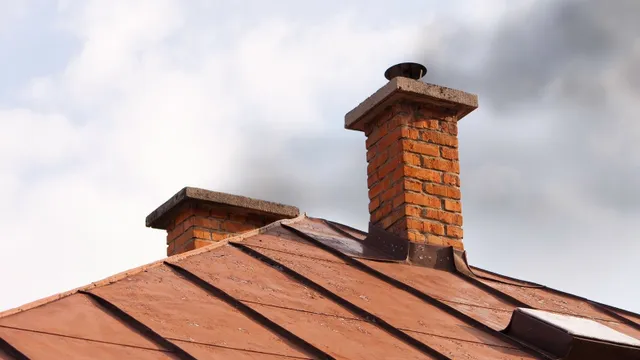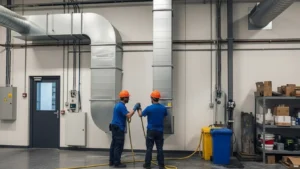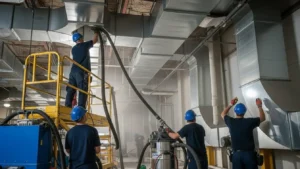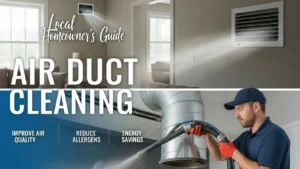People often get confused and wonder when is the best time to have their chimneys cleaned.
Many believe that the best time for chimney cleaning is during the fall season.
That’s when they decide to use the chimney.
However, the truth is completely opposite, as people usually prefer cleaning chimneys during the spring.
The thing you need to understand is that chimneys only tend to become dirty when they are filled with creosote, a flammable substance that builds up gradually within the fireplace.
For someone who doesn’t use the chimney too often, there’s a high possibility that it has no creosote deposits accumulating. If they don’t tend to use it at all, they can go around without cleaning for years or even more. Since people don’t use the fireplace all summer, there’s no possibility of creosote building up until the fall season arrives. If a chimney is not used by then, it can survive another summer easily.
But keeping all of this aside, let’s learn when is the best time of the year to clean chimneys.
So without further ado, let’s learn about the best time for chimney cleaning.
Seasonal Considerations
Is Fall an Ideal Time for Chimney Cleaning?
In the United States, fall is often considered an ideal time for chimney cleaning.
As the weather begins to cool down and homeowners prepare to use their fireplaces or wood-burning stoves during the colder months, it is recommended to have the chimney inspected and cleaned.
This proactive approach helps ensure that the chimney is free of creosote buildup, debris, and potential blockages that could pose a fire hazard.
By scheduling chimney maintenance in the fall, individuals can address any issues before the peak of the heating season, promoting both safety and efficiency in their heating systems.
Is Spring to Summer an Ideal Time for Chimney Cleaning?
While fall is commonly regarded as an ideal time for chimney cleaning in the United States, the transition from spring to summer may not be the most practical time for this maintenance task.
During the warmer months, many households reduce or cease using their fireplaces. As a result, the chimney is less likely to accumulate creosote and other deposits.
Therefore, scheduling chimney cleaning in the spring to summer may not be as significant as doing so in the fall when preparations for increased fireplace usage in the colder seasons are underway.
Is Summer to Fall an Ideal Time for Chimney Cleaning?
No, summer to fall is not typically considered the ideal time for chimney cleaning in the United States. As mentioned earlier, fall is generally recommended for chimney cleaning as homeowners prepare for increased fireplace or wood-burning stove usage during the colder months.
During the summer, when heating appliances are often not in use, creosote and debris buildup in the chimney is minimal. However, it’s essential to have the chimney inspected and cleaned before the heating season begins in the fall to ensure safety and efficiency.
Scheduling chimney cleaning in late summer or early fall is more appropriate to address any potential issues before colder weather sets in.
Also Read: Should I Vacuum Before Or After Duct Cleaning?
Factors to Consider Before Opting in For Chimney Cleaning
The frequency of fireplace use, the type of fuel burned, and local regulations are indeed key factors influencing the recommended frequency of chimney cleaning:
- Frequency of Fireplace Use:
More frequent use of the fireplace usually means more frequent cleaning is necessary.
Regular usage can lead to the accumulation of creosote, soot, and debris in the chimney. If the fireplace is used frequently during the colder months, it’s advisable to have the chimney inspected and cleaned annually or more often if needed.
- Type of Fuel:
The type of fuel burned in the fireplace significantly impacts the rate of creosote buildup.
Wood fires, in particular, produce more creosote than other fuels. Creosote is a highly flammable substance that can lead to chimney fires if not removed regularly.
If wood is the primary fuel, more frequent cleaning may be required compared to gas or pellet-burning fireplaces.
- Local Regulations:
Local regulations and building codes may stipulate mandatory chimney cleaning requirements.
Some areas have specific guidelines regarding the frequency of chimney inspections and cleanings for safety and compliance reasons.
It’s important for homeowners to be aware of these regulations and ensure the safety of their fireplaces.
Conclusion
In short, the best time for chimney cleaning is definitely fall or winter.
Getting it done before the colder weather makes sure your fireplace or heating system keeps running efficiently. When you opt-in for chimney cleaning during the fall season, you reduce the chance of creosote development, and you also make sure your chimney is functioning correctly, delivering optimal performance.
So, don’t wait—schedule chimney cleaning with Omega Duct Cleaning in the fall or winter for a cozy and secure home during the colder months.




